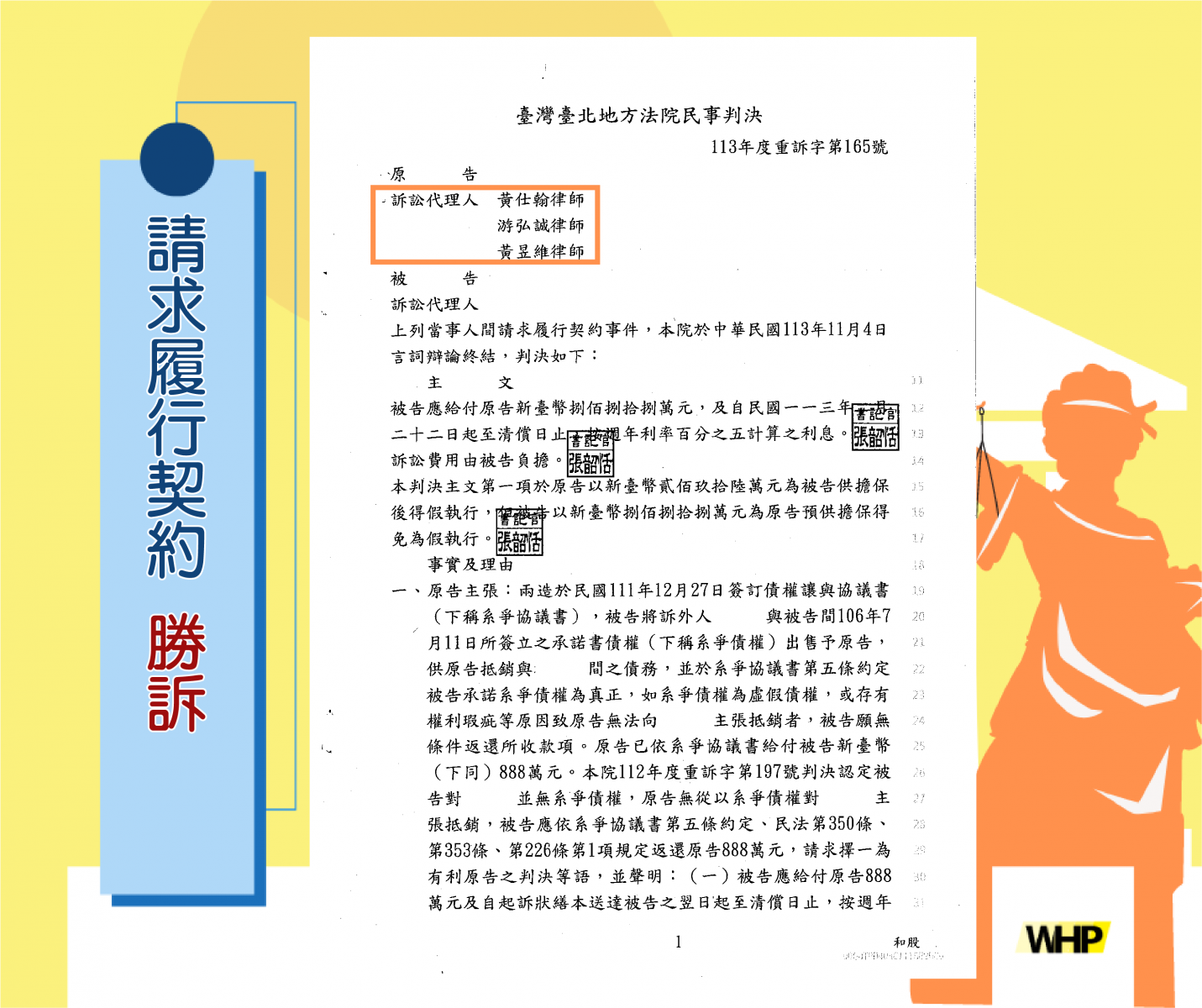首頁 >
| Civil Case | False Claims in Assignment of Debt: Victory in Contract Enforcement

Relevant Legal Provisions
| performance becomes impossible due to reasons attributable to the debtor, the creditor may seek compensation for damages. | |
| The seller of a claim or other rights shall warrant the actual existence of such rights. Sellers of securities shall also warrant that the securities have not been invalidated due to public notice. | |
| a seller fails to fulfill obligations specified in Articles 348 to 351, the buyer may exercise their rights in accordance with the provisions regarding non-performance of obligations. |
Facts and Reasons
In this case, the plaintiff and defendant entered into a debt assignment agreement (hereinafter referred to as the "Disputed Agreement"). Under the agreement, the defendant sold a debt claim derived from a prior "Letter of Commitment" between the defendant and a third party (hereinafter referred to as the "Disputed Debt"). The plaintiff intended to offset a debt it owed to the third party using the Disputed Debt. However, in a separate judgment, the court determined that the defendant did not possess any valid claim against the third party. Consequently, the plaintiff could not exercise the offset against the third party, rendering the Disputed Debt void.
Judgment
The plaintiff asserted that the parties entered into the Disputed Agreement, the defendant sold the Disputed Debt, originating from the "Letter of Commitment" dated July 11, 2017, to the plaintiff. The agreement explicitly stipulated, in Clause 5, that the defendant warranted the validity of the Disputed Debt. In the event that the claim was proven false or defective, thus preventing the plaintiff from exercising offset against the third party, the defendant agreed to unconditionally return the funds received.
The plaintiff demonstrated having paid the defendant NT$8.88 million under the Disputed Agreement, substantiated by presenting the agreement itself, which the defendant did not contest. The authenticity of the agreement and its terms was therefore deemed credible.
Given the conclusive evidence, the court accepted the plaintiff’s claim that the defendant lacked any valid claim against the third party, which nullified the plaintiff’s ability to assert an offset. Accordingly, pursuant to Clause 5 of the Disputed Agreement, the plaintiff's request for the return of NT$8.88 million from the defendant was justified and warranted approval.
Attorneys:Vincent Huang、Kevin Yu、Webber Huang
-
12.17 2024
Civil Case | False Claims in Assignment of Debt: V...
-
12.10 2024
Sexual Harassment | Defendant Not Prosecuted for S...
-
12.03 2024
Breach of Trust | Defendant Successfully Acquitted...
-
11.26 2024
Involuntary Manslaughter | Defendant Accused of In...
-
11.19 2024
Labor Standards Act | Claim for Related Costs Afte...
-
11.12 2024
Insurance | Confirmation of the Insurance Contract...
-
11.05 2024
Forgery of Documents | Successfully Achieved a Non...
-
10.29 2024
Theft | Theft, Successful Acquisition of a Residen...
-
10.22 2024
Drug | Successfully Secured Probation for Use of S...
-
10.15 2024
Damages Compensation | Our Client Was Accused of I...
-
10.08 2024
Money Laundering | Successfully Appeals for Suspen...
-
10.04 2024
Leasing | Our client successfully recovered the re...
-
09.24 2024
Traffic Accident | Defendant Wins Civil Tort Compe...
-
09.10 2024
Civil Tort Case | Defendant Won the Claim for Dama...
-
09.03 2024
Damages | Civil Mediation Successfully Reached by ...